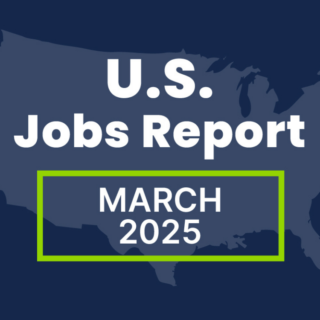We’re hearing about artificial intelligence everywhere these days. It’s constantly in the news with developments like self-driving cars. If you’re interacting with a company through a website chat window, chances are you’re talking to a computer.
Now, applications of AI like machine learning and natural language processing are transforming talent acquisition. The right AI tools can streamline the sourcing and recruiting process, providing a better candidate experience and keeping your organization ahead in the tight talent landscape.
When you think about AI, think of artificial intelligence as the umbrella term. Put most simply, it is a branch of computer science that involves computers doing things normally done by people. Different applications of AI can play different roles throughout the talent acquisition process. To attract and hire the best talent, employers need a process with a strong candidate experience and a partner with the expertise to identify the best person for a job. To accomplish that, it’s important to understand the different applications of AI and how they can optimize every step of a candidate’s journey.
Machine Learning
Machine learning is the next step in artificial intelligence, where computers are able to learn how to do something without being specifically programmed how to do that one thing. Machine learning develops algorithms, which are procedures or processes for solving problems.
Examples of machine learning are everywhere. Email spam filters learn how to identify spam depending on context and subject. Facebook’s photo tagging algorithm learns to recognize faces based on previous tags.
Machine learning can have impacts throughout the talent acquisition process. When applied to the sourcing process, machine learning technology can identify active and passive candidates within seconds of a job requisition being posted. There is so much publicly available information about which candidates are likely to join a company or leave their current job. This saves time for the recruiter and can provide valuable information including how likely a person is to leave their current job or how well their past experience meets the job description.
When it comes to the application process, machine learning technology can help create a personalized experience for the candidate. By analyzing the information a candidate shares online, the technology can provide them with job openings that fit their interests and experience.
Natural Language Processing
Natural language processing (NLP) is a way for computers to understand and interpret human language. It’s particularly difficult because human language is never as uniform and simple as code. When people talk and write, they have regional differences, use metaphors and display emotional cues that impact the meaning of what they’re saying. When people interact with AI, natural language processing is important for creating a positive interaction. A chatbot needs to understand what people are saying to respond properly. A virtual assistant needs to process and respond to the speech of people with different accents and dialects.
NLP should play a large role throughout talent acquisition. Starting with the process of crafting job descriptions, NLP can help write a description that attracts more strong candidates. In sourcing, an AI tool needs to have NLP to search for quality candidates and understand the information they share through social media and other online resumes.
Additionally, chatbots can play a role in the application process, reducing the need for long application forms, and perform some candidate prescreening. This can free up more time for recruiters, but it can also improve the candidate experience. Business Insider reports that people are growing more comfortable with, and in some cases even prefer, interacting with a chatbot over another person. To accomplish this and provide a good candidate experience, natural language processing is necessary.
Predictive Analytics
Predictive analytics finds patterns in data and then uses those patterns or models to attempt to predict the future. Predictive analytics can’t tell you what will happen, but it shows what is likely to happen based on past trends. It works by taking large sets of data and then applying artificial intelligence technology to see trends and patterns that would be difficult, time-consuming or possibly impossible for humans to accomplish alone.
Predictive analytics can make an impact throughout the entire hiring process. The ability to make predictions and suggest a certain course of action can give employers a better understanding of factors like how long it will take to fill a position or what kind of salary and benefits package will be required to secure a successful candidate.
When it comes to candidate success, predictive analytics can use candidate assessments to predict how successful a person will be in a given role and even how long they may stay with the company. Armed with that information, organizations can make better hiring decisions.
Robotic Processing Automation
Robotic processing automation (RPA) is the process of using software to automate simple business tasks. According to the Wall Street Journal, RPA works by following simple rules to mimic the way that people interact with different business applications. By doing this, the technology is able to automate manual processes that would be tedious or time consuming for a worker.
RPA can automate many of the administrative tasks that can take up a lot of a recruiter’s time. When a job requisition opens, RPA can automate the keystrokes required to submit information and post jobs to sources that require manual submission. Additionally, it can automate the distribution of job openings notifications to community organizations. This can ensure a job posting reaches as many candidates as possible and save recruiters’ time for more valuable tasks, like engaging with the strongest candidates.
RPA can also play a role after a candidate accepts an offer. The technology can automate many of the post-offer activities that clear candidates for hire, like collecting more information from candidates, submitting forms and processing pre-employment checks.
To learn more about how PeopleScout is using AI in Affinix and how it can help you get ahead, schedule a candidate experience evaluation.



